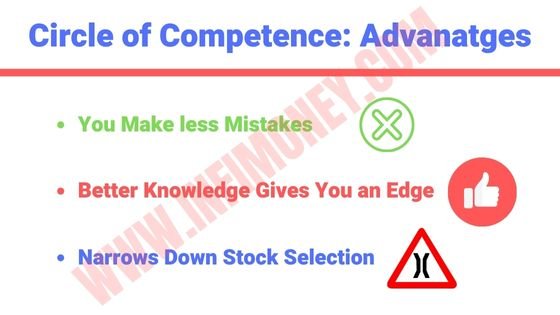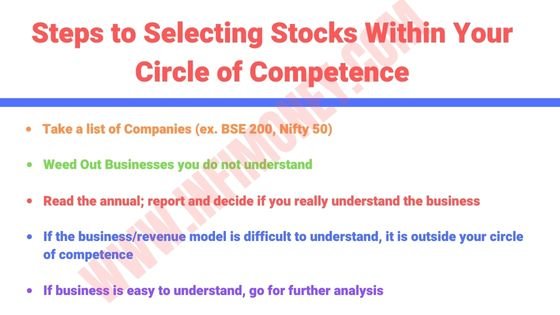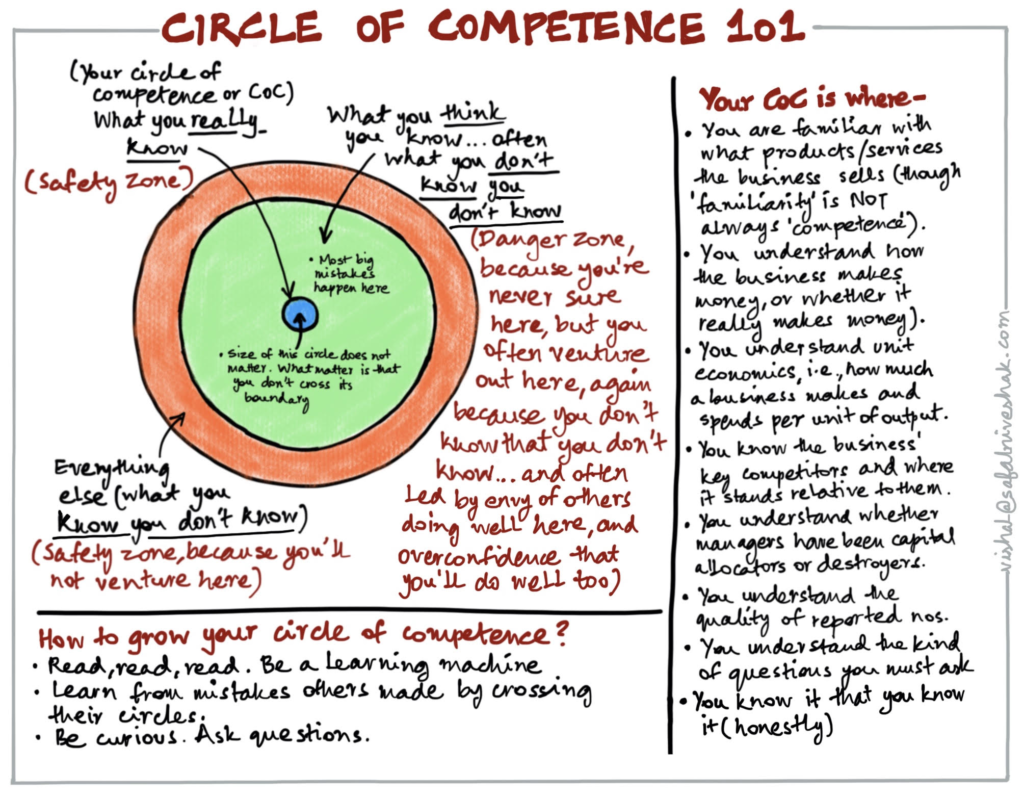Circle of competence is an age old concept of value investing, popularized by Warren Buffett
The first time concept of circle of competence gained popularity was when Warren Buffett in his Berkshire Hathaway letter to shareholders wrote:
“You don’t have to be an expert on every company, or even many. You only have to be able to evaluate companies within your circle of competence. The size of that circle is not very important, knowing its boundaries, however, is vital”
Warren Buffet

What is Circle of Competence?
The concept of circle of competence is pretty simple. When you do not know what you are doing, the risk of making a costly mistake is much higher than when you know what you are doing.
What does it mean? Put it simply, it means that you should invest in only those businesses that you clearly understand.
For example, a restaurant owner understands the economics of restaurant, such as how does the business model work? How much capital is required to scale a restaurant business? How long does it take to generate revenue?
Since he is an expert in his field, and understands them better than others, there is a higher chance that he will be more successful by investing in restaurant businesses like McDonalds, and Domino’s, instead of investing in a software company that he clearly does not understand.
So what are the advantages of investing within your circle of competence? And why should you follow this so religiously? Well, being in your circle of competence has many advantages. Some of the biggest ones are explained below:

Circle of Competence: Advantages
There are three big advantages of investing within your circle of competence.
You make less mistakes
Charlie Munger, partner of Warren Buffett says “If you make fewer mistakes, your investment performance will be better.”
When you stay within your circle of competence, you make an investment only when you understand a business thoroughly.
This minimizes your chance of making an investment mistake as you won’t make an investment decision unless you are pretty sure about the present situation and future of the business.
Most investors lose money not because they are poor at picking the right stock, but because they pick stock without understanding the business properly.
For example, if a doctor invests in a company that makes automobiles, without understanding the business model of the company, its management, and its revenue streams, he may sell the stock just because it had a poor quarter, ignoring the fact that automobile industry will do well in the long term.
Investors who invest within their circle of competence, (no matter how small it is), understand the business thoroughly and have a decent idea of how the long term future of the company is going to be.
Better Knowledge gives you an edge
Investing within your circle of competence gives you an unfair advantage over others. This edge helps you in getting better insights of a business which no other person can have.
Thus, when you invest within your circle of competence, you play on your strength, which gives you a better chance of winning.
For example, a real estate agent or broker has a better idea of which locations are currently best for investment and which ones are going to see a huge growth in the coming future.
Similarly, while investing in stock market, when you invest in stocks within your circle of competence and have better knowledge and experience about, your odds of success are much higher.
Narrows down the Stock Selection
This is one of the biggest advantages of investing within your circle of competence. There are more than 5,000 stocks listed in the Indian stock market, going through each of them is impossible.
Warren Buffett rejects majority of stock ideas he comes up with just because they fall beyond his circle of competence.
He has a box on his desk that says “Too hard” where he keeps all the stocks he does not understand. As per Warren Buffett, it is the biggest box in his office.
Suggested Read: 5 Things Warren Buffett looks for before investing
Despite Bill Gates being his best friend, Warren Buffett never invested in Microsoft, as it falls outside his circle of competence, and he does not understand the business, and thus, cannot make rational projections about its future.
While picking stocks for your investment, you focus on only those that fall under your circle of competence, thus significantly narrowing down your search area, making it easier for you to pick the best among those you really find comfortable to invest.
Now comes the biggest and the most important question. How do you determine your circle of competence? How would you determine if a stock in front of you falls within your circle of competence or not?
How to Find Your Circle of Competence?
Finding your circle of competence is no rocket science, in order to determine if a stock falls under your circle of competence, you must be able to understand the underlying economics of it.
Vishal Khandelwal, Author of Safal Niveshak in his value investing master class says, in order to find if a stock or business falls under your circle of competence, you must be able to find the answers to following questions:
How it works?
It means how does the business work? What is the basic business model? Does it depend on single source of revenue for its survival or does it have multiple income streams?
Answering these questions will help you understand the business and revenue model of the company, a preliminary requirement before choosing a stock to invest.
If you do not understand the business model of the company, it is better to skip that business and look elsewhere.
What drives Growth?
The second question that you should be asking yourself is what drives the growth of the company? Will the demand for the products or services offered by the company continue in the future? What will drive the growth in business?
Finding the answers of the questions above will help you determine longevity of a business, if the economy will continue to support it, and if it has the ability to stay ahead of the competitors.
If a business requires continuous innovation, capital investment and can be easily taken over by the competitors, it raises questions on its longevity, and thus should be avoided.
Many tech companies that were once seen as great stocks for long term, were crushed by competitors.
Companies with questionable durable competitive advantage should be avoided for your long term investment portfolio.
How does it stand against its competitors?
The most important question an investor must find an answer to is, how the company in question will manage to stand against competition.
Every company needs to fight competition in order to stay ahead in the game, thus, if a company has to ensure longevity, it must have some inherent quality that helps it stand out from its peers.
There are many ways companies can do this, by being a low cost player, providing products or services at lowest price possible (example, big bazaar, a low price discount store), creating a brand name(Nestle, Britannia, Colgate), by creating a monopoly (Coca Cola).
Companies that deal in commodity type products (such as Iron and steel), have to play on low price model. While it may help gain advantage over peers, it may hurt the profit margins of the company, as there is a lot of cost optimization involved.
On the other hand companies that create a brand name or monopoly, can last longer and have better pricing power on their products, thereby protecting and enhancing their profit margins.
Here is how Vishal beautifully sums up the definition and execution of investing within your circle of competence in a simple, info-graphic.
But how do you select stocks based on your circle of competence? Here is a simple step by step process on how to determine your circle of competence and how to select stocks based on your circle of competence.
How to select Stocks based on your circle of competence
Step 1: Take a list of companies, lest say Nifty 50, or BSE 200 index. You can easily find the list on nseindia.com or moneycontrol.com
Step 2: Start creating your circle of competence by weeding out businesses that you do not understand.
Step 3: Once you have the list of stocks, you think you understand, pick up their annual report and read it, and then decide if you are really able to understand the business ( if you can answer all the questions mentioned in the previous section, then you can assume you understand the business fairly well.)
Step 4: If the business model of the company is difficult to understand or if the revenue model of the company is too complex, then the stock is out of your circle of competence and should be avoided.
Step 5: For businesses that are simple to understand, you should add them to your circle of competence, and go a step further analysing fundamentals of the company in detail.

Circle of competence is all about knowing your boundaries, your circle of incompetence, and look within that circle. It does not matter how big or small your circle of competence is, what matters is knowing the edges of your boundaries, and not crossing them.
I know you have a question in mind, what of I want to expand my circle of competence? Is it possible to do so?
The short answer is yes. The best way to expand your circle of competence is to read a lot and learn a lot.
Charlie Munger talks about how you can expand your circle of competence by reading more.
“In my whole life, I have known no wise people (over a broad subject matter area) who didn’t read all the time – none, zero. You’d be amazed at how much Warren reads – at how much I read. My children laugh at me. They think I’m a book with a couple of legs sticking out.”
So read a lot, that is the only and the most sure shot way to expand your circle of competence.
Conclusion
The conclusion of the entire post is, you don’t have to be a genius in stock picking if you want to be a successful investor, nor are those people (including me) who look like they know a lot.
The secret of successful investing is to make fewer mistakes by avoiding stocks that are outside your circle of competence.
It is always better to have few stocks in your portfolio that you are sure about, instead of having a tons of them, you have no clue of.
I hope you found this article useful and enjoyable, thank you for reading, happy investing.
